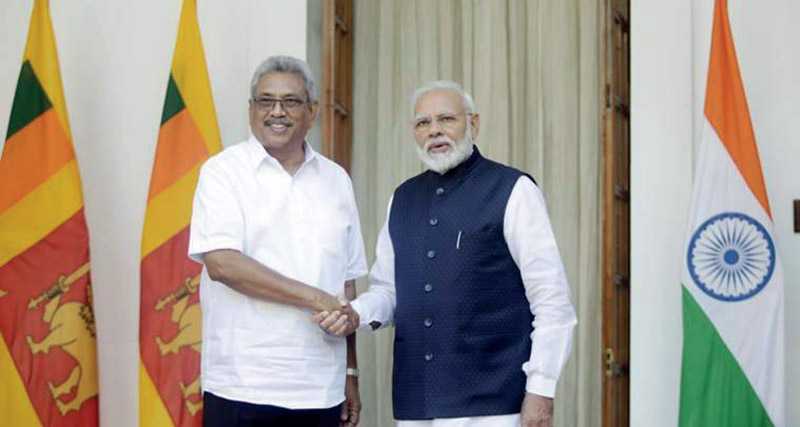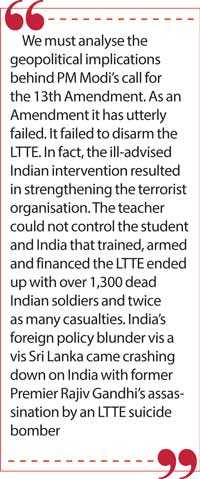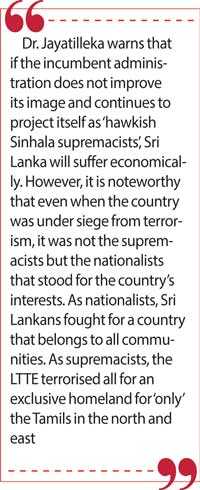Saturday Feb 07, 2026
Saturday Feb 07, 2026
Friday, 30 October 2020 00:30 - - {{hitsCtrl.values.hits}}

PM Modi was wrong to reiterate his call for the 13th Amendment’s implementation – especially when President Gotabaya Rajapaksa had already articulated his position on the matter. In the past, this has been a bait for the Tamils in the north and east to turn antagonistic to their own Government. This kind of interference on Sri Lanka’s internal affairs had not only led to the destruction of innocent lives, but had been catastrophic to India as well
By Shivanthi Ranasinghe
It is ironic that Dr. Dayan Jayatilleka’s ‘Avoidable Crashes: Economics and External Affairs’ was published on 15 October. Exactly 30 years ago to this date, the LTTE began its brutal campaign of evicting Muslims from the Northern peninsula. Over the next two weeks, the LTTE targeted different areas of the peninsula and systematically forced the Muslims out of their homes at gunpoint. By 30 October 1990, all Muslims were forced out.
They were robbed of their valuables, dignity and heritage. Those who accuse the Sri Lankan military of ‘credible war crime allegations’ never speak of this atrocity, which includes the kidnapping of wealthy Muslim entrepreneurs. While some returned to their families after paying a hefty ransom, others have  disappeared to thin air. D.B.S. Jeyaraj’s “LTTE’s Mass Expulsion of Muslims from the North 30 Years Ago” is a worthy read.
disappeared to thin air. D.B.S. Jeyaraj’s “LTTE’s Mass Expulsion of Muslims from the North 30 Years Ago” is a worthy read.
As revealed at the LLRC, the Sinhalese had been ethnically cleansed long before this date. Forcing Sinhalese out began as far back as 1977. By 1987, out of the 5,684 families recorded by the 1981 census, there was not a single Sinhalese living in the north.
This is how the north became exclusive to Tamils. The east, despite its violent past and brewing extremism, continues to home almost equal proportions of the three communities. The Muslims though may soon overtake the other two communities. Even with a near 100% Tamil population in the north, more than 52% of the Tamils continue to live outside the Northern and Eastern Provinces. For the first time since 1975, the Northern and Eastern Tamils have expressed their confidence in the incumbent administration via the August 2020 General Elections.
Premier Narendra Modi faux pas
Indian Premier Narendra Modi ignored all these glaring facts when he reiterated the long hackneyed demand for ‘Tamil aspirations’ at the virtual bilateral summit with Premier Mahinda Rajapaksa on 26 September 2020. It is just not possible to devolve power to the Tamils in the north and east. Before any political solution can be considered, the grave injustice to the Sinhalese and the Muslims who were living in these areas must be corrected. As attorney-at-law and author Dharshan Weerasekera reasons, to ignore this fundamental step “would in effect be validating ethnic cleansing as a tactic for gaining ‘self-determination’”.
Dr. Jayatilleka warns that if the incumbent administration does not improve its image and continues to project itself as ‘hawkish Sinhala supremacists’, Sri Lanka will suffer economically. However, it is noteworthy that even when the country was under siege from terrorism, it was not the supremacists but the nationalists that stood for the country’s interests. As nationalists, Sri Lankans fought for a country that belongs to all communities. As supremacists, the LTTE terrorised all for an exclusive homeland for ‘only’ the Tamils in the north and east.
In their quest, they terrorised the Tamil civilians the most. Those who could escape from the physical reach of the LTTE’s terrorism and fascism did do so. Many resettled outside the north and east and only returned after the LTTE was annihilated. Others in Western countries can now enjoy their comfortable lives in peace as the extortionists who used to regularly visit have disappeared. Those who escaped to Tamil Nadu too would like to continue with the lives that they had rebuilt in India. However, most are still confined to refugee camps and subject to strict regulations.
Thus, for PM Modi to speak of ‘Tamil aspirations’ without addressing this anomaly is questionable. However, the greater concern is that for over four decades Sri Lanka has been unable to convince the world that the issues before the Tamils are not exclusive to the minorities or the privileges are not only for the Sinhalese. Just as there are very wealthy and successful Tamils, many Sinhalese are poverty stricken. When the LTTE was enjoying ‘the upper hand’, the Tamils preferred to live amongst the  Sinhalese.
Sinhalese.
Yet, this has not been communicated to the world. Dr. Jayatilleka’s article may hold the clue to this abysmal failure. It appears that he is intimidated by the ‘colossal asymmetry of power’ wielded by India. He is aghast that a State Minister dared to state the obvious that the Indian Premier was out of line. Yet, as the subject minister, Rear Admiral Sarath Weerasekera was correct to point out that implementing the 13th Amendment or to change the unitary status of the country to a united nation is a decision solely for the people of Sri Lanka. As a subject expert, Minister Weerasekera was also correct to note that the 13th Amendment is not a solution for Sri Lanka.
Surely, as a seasoned political analyst and a former diplomat, Dr. Jayatilleka cannot find the Indian Premier’s focus on one ethnicity acceptable. This was a bilateral summit and as such, was between nation to nation. Thus, neither country can address the concerns of only one community as artfully demonstrated by Premier Rajapaksa. The very implication that arises by doing so is undiplomatic and therefore unacceptable. In fact, PM Modi committed quite a faux pas by calling on the Sri Lankan Government to ensure equality, justice, peace and respect to Tamils. By doing so, he accused Sri Lanka of maltreating Tamils.
Yet, even India knows that this is not the case as visible from the controversial India’s Citizenship Amendment Act. By excluding Sri Lankan Tamils from this Act’s eligibility list, India acknowledges that Tamils are not under any sort of persecution or discrimination in Sri Lanka.
Small is no reason to be scared
It is true that territorially Sri Lanka is a small landmass. As Dr. Jayatilleka notes, “Sri Lanka is no longer simply on the doorstep of the regional sub-super power; it is now located on the doorstep of a member of ‘The Quad’, a quasi-military, strategic alliance covering the Indo-Pacific vastness, with implications for the global balance.”
On this basis, if we are to silently concede to India simply because it is a larger force and a member of an even greater force, what should be our position if the Muslim nations collectively impose on us to deliver on the ‘aspirations’ of the Muslims? The ‘extremist’ Tamil youth fought for an exclusive Tamil homeland while the ‘moderate’ Tamil elders worded it as ‘devolving power’ for Tamil areas. The Easter attack by the ‘extremist’ Muslims was to rid the non-believers. Can we even allow a ‘moderate’ wording of this ‘aspiration’?
Clearly, Sri Lanka cannot afford to cower in fear or nod to every diktat in silent submission just because we are small. It means that we need to learn to speak up and articulate our position clearly. We need to be a lot more politically savvy than we are presently.
Therefore, we must analyse the geopolitical implications behind PM Modi’s call for the 13th Amendment. As an Amendment it has utterly failed. It failed to disarm the LTTE. In fact, the ill-advised Indian intervention resulted in strengthening the terrorist organisation. The teacher could not control the student and India that trained, armed and financed the LTTE ended up with over 1,300 dead Indian soldiers and twice as many casualties. India’s foreign policy blunder vis a vis Sri Lanka came crashing down on India with former Premier Rajiv Gandhi’s assassination by an LTTE suicide bomber.
Nalini Sriharan is currently the sole surviving member of the five-team squad accused in connection of the assassination. After Sonia Gandhi’s appeal for clemency, her death sentence has been commuted to life imprisonment. Rotting away for the last 29 years in jail, she is India’s longest serving female prisoner. Those who fight for Easter attack suspect Hijaaz Hisbulla’s release are silent over the torture and indignity Sriharan is said to suffer. According to her mother, Sriharan is not even allowed access to her own lawyer. These allegations, if true, are a testament of India’s bitterness over the episode.
India’s cost is however not remotely close to that of Sri Lanka. The IPKF left abandoning the crucial satellite military camps. These were promptly taken over by the LTTE. Over the next 19 years, the LTTE grew in strength and ferocity. The LTTE was not only a threat to Sri Lanka, or the region but to the whole world. Its ships provided logistics to other terrorist organisations and smuggled people and narcotics that mostly ended in the Western streets. Sri Lanka must be saluted for defeating the LTTE against all odds.
Who wants the 13th Amendment?
Presently, the Provincial Councils ushered by the 13th Amendment are defunct because of the mess created by the Yahapalana Government, in which the TNA was a significant partner. Yet none of the minority politicians are worried over the PCs’ fate. TNA’s proposed constitution attempted to turn PCs into power centres and render the Central Government powerless. This would have adversely affected the minority communities living outside the north and east. The minorities therein will be under the rule of that province’s majority community. They would be without an overriding power to redress any communal injustice. In this context, the outcome of the east will be interesting, where the Tamil and Muslim communities vie for dominance.
The two provinces – north and east – cannot and should not be merged without a referendum. It is unlikely that the Muslims in the east would agree to a merger that would bring them under Tamil dominance. Without the merger, the Eastern Tamils would be under the Muslim dominance, which would be disagreeable to them.
Therefore, it is very clear that unless force is used the 13th Amendment is not feasible. Even then, it will not resolve any real or perceived grievance, but likely create problems of unmanageable proportions. Yet, as observed by Dr. Jayatilleka, “Prime Minister Modi only reiterated what he had said many times before”. The reasons for India’s continued interest in an unattainable objective ought to pique political analysts’ interest.
‘Good Governance’ as elusive as the 13th Amendment
The unhappy truth is that the West bludgeons Sri Lanka on imaginary human rights allegations. Likewise, India uses the 13th Amendment to keep Sri Lanka off balance. Both the West and India scheme to manipulate Sri Lanka’s governance. Dr. Jayatilleka’s argument that the Western investor/buyer is morally conscious is illogical when the worst violators are the West and have been so for the past so many centuries. West is more adaptable as obvious with their relationships with countries with terrible political and humanitarian track records.
We must not repeat Yahapalana Government’s mistakes. Instead of standing firm on the ground that we had not committed war crimes nor engaged in systematic discrimination, we timidly scrambled to measure up to ‘good governance’. This exposes our failure in foreign relations. Our attempt to please the ‘asymmetrical powers’ resulted in dismantled intelligence networks, incompetent officers, a confused chain of command, politicised commissions and the worst terrorist attack on Sri Lankan soil.
Interestingly, not a single Western Government or agency nor India for that matter has expressed an opinion over any of these failures. On the other hand, grave concerns over the ‘draconian measures’ taken over the COVID-19 pandemic and the 20th Amendment were prompt. The Gotabaya Rajapaksa Administration’s success in containing the pandemic and managing associated social costs was impressive. Furthermore, the Administration’s quick responses and timely safeguards protected and strengthened the economy to outperform even pre-pandemic days. Studiously ignoring all these achievements, serious doubt is now being cast over Sri Lanka’s ability to meet its financial commitments. This is clearly to dissuade investors and lenders.
Towards a peaceful coexistence with all stakeholders
To be pro-nationalist does not make one an antagonist of another nation or a xenophobic. Therefore, speaking on behalf of Sri Lanka does not make one anti-Indian, anti-West or an isolationist. In fact, if we are to enjoy robust relations with the world, Sri Lanka must learn to speak up and have the courage to call a spade a spade.
This is especially important as the US gears itself to defend their interests against China’s rise in power. Most of our neighbours have already picked a side. Sri Lanka on the other hand has taken the challenging but noble path to maintain a zone of peace for all to trade and engage in commercial activities.
In this context, PM Modi was wrong to reiterate his call for the 13th Amendment’s implementation – especially when President Gotabaya Rajapaksa had already articulated his position on the matter. In the past, this has been a bait for the Tamils in the north and east to turn antagonistic to their own Government. This kind of interference on Sri Lanka’s internal affairs had not only led to the destruction of innocent lives, but had been catastrophic to India as well. Therefore, it behooves India also to move out of ‘traditional politics’ and partner with Sri Lanka towards a peaceful coexistence with all stakeholders.
(The writer can be reached via [email protected].)